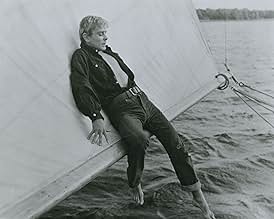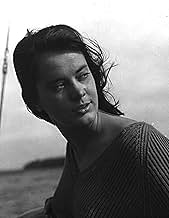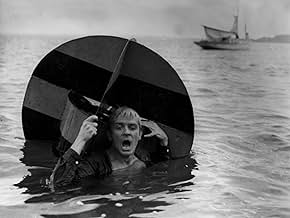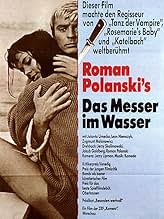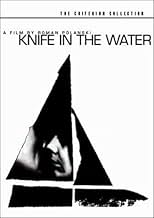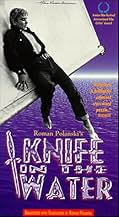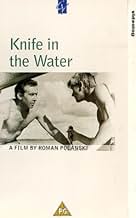PUNTUACIÓN EN IMDb
7,4/10
24 mil
TU PUNTUACIÓN
Un matrimonio mayor invita a un joven autoestopista a unírseles en un viaje en barco.Un matrimonio mayor invita a un joven autoestopista a unírseles en un viaje en barco.Un matrimonio mayor invita a un joven autoestopista a unírseles en un viaje en barco.
- Nominado para 1 premio Óscar
- 1 premio y 2 nominaciones en total
Anna Ciepielewska
- Krystyna
- (voz)
- (sin acreditar)
Roman Polanski
- Young Man
- (voz)
- (sin acreditar)
Argumento
¿Sabías que...?
- CuriosidadesThe first scene in the film shows Andrzej and Krystyna driving a car. As shooting from the platform in front of the car was not yet available, the crew was tied to the car, standing on its mask. To get the proper light effects, they held a blanket with a small hole for the camera. Leon Niemczyk (Andrzej) was really driving this car quite fast (this was crucial to this scene), but he couldn't see anything. He drove the car using the tops of the trees to imagine where the road is.
- PifiasWhen the young boy is trying to stabilize the Christine by hanging off its side, the railing of the camera boat can be seen in the lower left-hand corner of the screen.
- ConexionesEdited into Spisok korabley (2008)
Reseña destacada
There is nothing more thrilling than discovering a natural filmmaker for the first time. There are only so many, and you can only have menarche once. Its an introduction into another life.
I first saw this in 1965 at the Orson Welles Cinema near Harvard Square. We were told it was made behind the backs of Iron Curtain thugs, only surviving because of international attention. (I wouldn't meet Tarkovsky or Kieslowski until later.) And that it was made by the fellow who had made the striking "Repulsion," which at that time was anticipated but yet unseen in the States.
I've since learned some striking things: that both Polanski and his co-writer wanted to play the hitchhiker and indeed it is Polanski's voice. And that the mistress who seems only half alive was in fact played by a non-actress they found by looking at swimming pools. Also that the situation was suggested by a long planned and discussed Orson Welles project ("The Deep") that was started after this and never completed.
The writing is good of course, especially the central image the title denotes, but the camera finds the perfect place always. It is like Altman's camera (after this) that discovers the action rather than, say Spielberg's where the action is obviously happening in such a way to be cleanly seen by the camera. And so much harder on a boat!
But the interesting thing about such an introduction to a filmmaker is the relationship that follows: we know certain things about how he thinks and sees. We expect the conversation to continue and mature over the years. And what a rocky ride this man has taken us on, through perfectly created worlds (in which I include "Ninth Gate") but also through pure dreck and rank sentimentality (both of which tag "The Pianist").
Sometimes he's internal to the narrative, even the charmed actor. Sometimes he is outside the narrative, pulling strings (as with this film) but sometimes it is clear he never got out of bed.
As with Kubrick and so many others, you really must start at the beginning, which essentially means here.
Ted's Evaluation -- 3 of 3: Worth watching.
I first saw this in 1965 at the Orson Welles Cinema near Harvard Square. We were told it was made behind the backs of Iron Curtain thugs, only surviving because of international attention. (I wouldn't meet Tarkovsky or Kieslowski until later.) And that it was made by the fellow who had made the striking "Repulsion," which at that time was anticipated but yet unseen in the States.
I've since learned some striking things: that both Polanski and his co-writer wanted to play the hitchhiker and indeed it is Polanski's voice. And that the mistress who seems only half alive was in fact played by a non-actress they found by looking at swimming pools. Also that the situation was suggested by a long planned and discussed Orson Welles project ("The Deep") that was started after this and never completed.
The writing is good of course, especially the central image the title denotes, but the camera finds the perfect place always. It is like Altman's camera (after this) that discovers the action rather than, say Spielberg's where the action is obviously happening in such a way to be cleanly seen by the camera. And so much harder on a boat!
But the interesting thing about such an introduction to a filmmaker is the relationship that follows: we know certain things about how he thinks and sees. We expect the conversation to continue and mature over the years. And what a rocky ride this man has taken us on, through perfectly created worlds (in which I include "Ninth Gate") but also through pure dreck and rank sentimentality (both of which tag "The Pianist").
Sometimes he's internal to the narrative, even the charmed actor. Sometimes he is outside the narrative, pulling strings (as with this film) but sometimes it is clear he never got out of bed.
As with Kubrick and so many others, you really must start at the beginning, which essentially means here.
Ted's Evaluation -- 3 of 3: Worth watching.
- tedg
- 19 ene 2005
- Enlace permanente
Selecciones populares
Inicia sesión para calificar y añadir a tu lista para recibir recomendaciones personalizadas
- How long is Knife in the Water?Con tecnología de Alexa
Detalles
- Duración1 hora 34 minutos
- Color
- Mezcla de sonido
- Relación de aspecto
- 1.37 : 1
Contribuir a esta página
Sugerir un cambio o añadir el contenido que falta

Principal laguna de datos
By what name was El cuchillo en el agua (1962) officially released in India in English?
Responde
